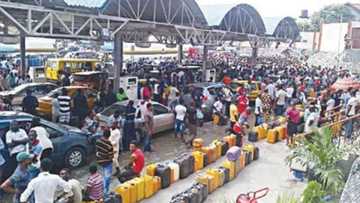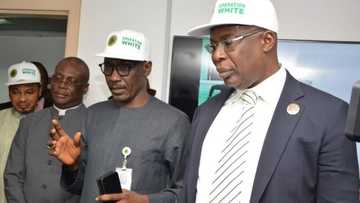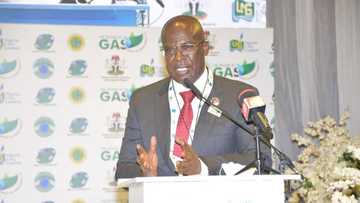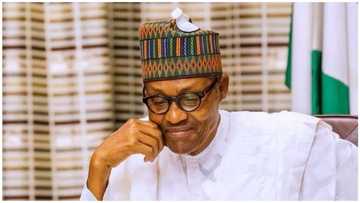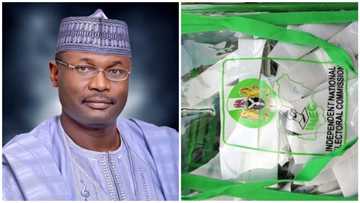Implications of Lingering Fuel Scarcity on Nigerian Economy by Jide Ojo
Editor's note: Jide Ojo, a veteran political analyst and newspaper columnist, writes about the lingering fuel scarcity in Nigeria and its implications on the nation's struggling economy.
PAY ATTENTION: Click “See First” under the “Following” tab to see Legit.ng News on your Facebook News Feed!
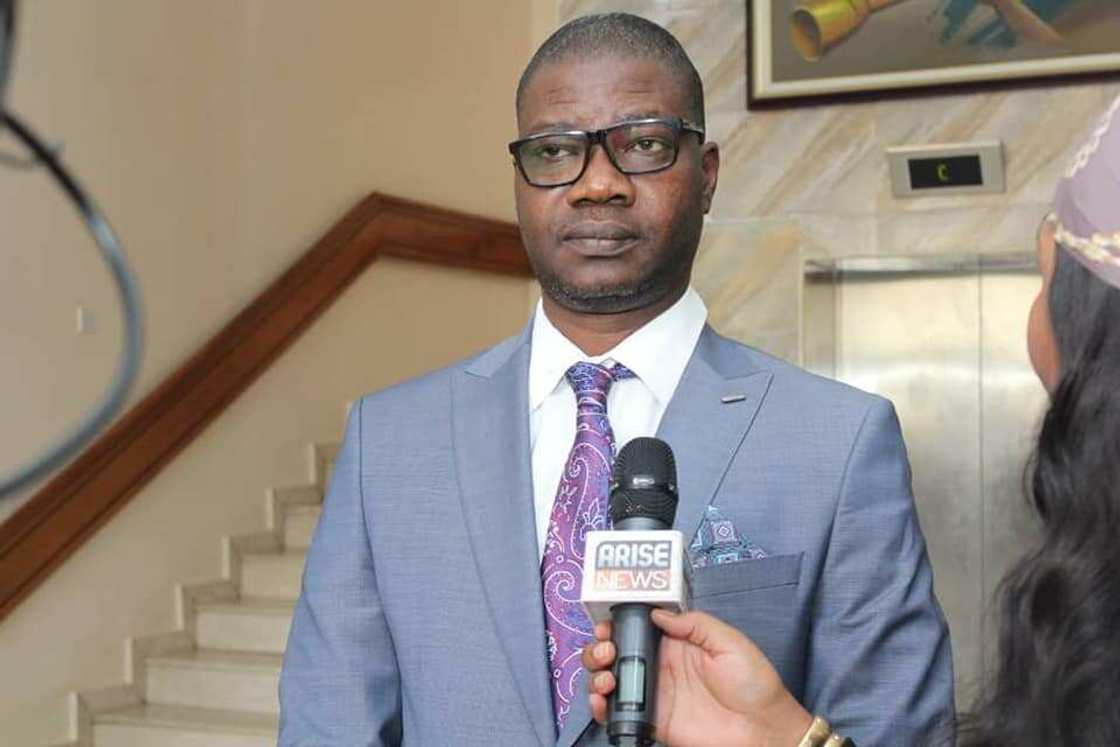
Source: Facebook
“Alleged corruption and mismanagement in the oil sector, the importation and distribution of dirty fuel, and protracted fuel scarcity amount to a fundamental breach of constitutional and international human rights obligations, depriving Nigerians of economic opportunities and subjecting them to cruel and degrading treatment.”
– Socio-Economic Rights and Accountability Project in a letter dated March 5, 2022 addressed to the President, Major General Muhammadu Buhari (retd.).
The first sign of fuel scarcity was noticed in Abuja about January 24, 2022 ahead of the planned nationwide protests by the Nigerian labour unions to prevent the Federal Government from removing fuel subsidy by July 2022. Nigeria Labour Congress and Trade Union Congress were to cancel the protest scheduled for January 27, 2022 after the Federal Government issued a statement suspending the removal of fuel subsidy for 18 months according to a January 25 statement credited to Minister of State for Petroleum Resources, Chief Timipre Sylva. The next thing we heard was the supposed importation of ‘dirty fuel’ from Belgium.
Group Managing Director of NNPC, Mallam Mele Kyari, stated that its investigation revealed the presence of methanol in four petrol cargoes imported by MRS, Emadeb/Hyde/AY Maikifi/Brittania-U Consortium, Oando and Duke Oil. Kyari in a media chat said he has since ordered the holding back of all the affected products in transit (both truck and marine). It was also gathered that the NNPC has asked oil trading firms to embark on an emergency supply of petrol to replace cargoes that were rejected because of their poor quality, The NNPC GMD noted that the corporation first received a report on January 20, 2022 from its quality inspector of the presence of “emulsion particles’’ in petrol cargoes shipped to Nigeria from the European country.
Do you have a groundbreaking story you would like us to publish? Please reach us through info@corp.legit.ng!
However, one of those indicted to have ferried in the adulterated fuel has lashed back at NNPC. MRS in a statement said “Due to the current subsidy regime, NNPC is the sole supplier of all PMS in Nigeria. Consequently, the NNPC through their trading arm Duke Oil, supplied a cargo of PMS purchased from international trader Litasco and delivered it with Motor Tanker Nord Gainer. This vessel discharged in Apapa between the 24th and 30th of January, 2022.” But the NNPC boss maintained that the methanol blended petrol was imported into the country by the suppliers, including MRS, through its Direct-Sales-Direct-Purchase arrangement.
It’s been six weeks of acute fuel scarcity now in Federal Capital Territory, Lagos, and several other states. I have not been able to brave the long queues and have had to buy fuel at black market at exorbitant prices ranging from N300 to N400 per litre. Quite unfortunately too, I have to similarly buy petrol to power my electricity generator as the light situation worsens across Nigeria. The question on the lips of many compatriots is, when shall this suffering end?
Section 14(2)(b) of the Nigerian 1999 Constitution says security and welfare of the citizens shall be the primary purpose of government. The security situation is already deplorable, now welfare is virtually non-existent for Nigerians. Since this round of fuel scarcity started, no government official has resigned or been sacked for putting Nigerians through this untold hardship. Yet, the president also doubles as the substantive Minister of Petroleum Resources. In saner climes, ‘heads would have rolled’ for this heinous economic crime.
The implications of this sustained and protracted fuel scarcity are numerous. It has led to a hike in the cost of living and cost of doing business as transport fare has increased by over 100 per cent. Food prices have similarly shot up due to the rising cost of transportation. A lot of productive man-hours are lost to queuing for petrol at the fueling stations. In the course of this scarcity, many vehicle engines have been damaged by adulterated fuel imported as well as those purchased from unwholesome black marketers whose sole aim is super-profit.
All manner of malpractices and sharp practices have been taking place at many of the fueling stations as bribery and corruption becomes the order of the day. Many of the retail outlets hoard their products and sell to those willing to pay above the official pump price under the cover of darkness. Hoarding of inflammable petroleum products such as petrol at home and other unsafe places have led to infernos of great magnitude thereby making victims incur great economic losses.
The most heart-rending thing is that N3tn has been earmarked for fuel subsidy by the Federal Government for 2022. Is it right to pay subsidy on this adulterated fuel and for these shortages? Why are we still having to import petroleum products despite having four petroleum refineries spread across Port Harcourt, Warri and Kaduna? Why is it that the billions of dollars spent on the turn-around maintenance of these refineries have not been able to revamp them?
According to a 21 March 2021 report in The Guardian of Nigeria: “The whopping sum of $26.5b, which the Federal Government has so far spent on the maintenance of its loss-making 445, 000 barrels per day capacity refineries, is capable of building three new refineries of the same size going by the cost analysis of refinery projects across the world.” It is obvious that corruption is the real reason behind the comatose of Nigeria’s refineries. I therefore endorse the call for a probe of NNPC and its subsidiaries by anti-corruption agencies as requested by SERAP.
The entire value chain in the petroleum sector of Nigeria is shrouded in opacity, fraud and inefficiency. It had been hoped that things would be different if the legal regime governing the country’s oil and gas sector is fine-tuned. Unfortunately, despite signing the petroleum industry bill into law on August 16, 2021, about seven months ago, not much has changed in the way the petroleum sector is run. Full deregulation has not been achieved and the country is haemorrhaging seriously from the extant guided deregulation of the country’s oil and gas sector. The culture of impunity that exists before the coming into force of the PIA still subsists and that is very saddening!
If election were to take place today in Nigeria, the waterloo of the ruling All Progressives Congress at the centre would have been a fait accompli. How could a government that came into power in 2015 on a mantra of change continue to govern in the same manner of its predecessor? In the ongoing season of anomie, no electricity, no fuel, no education at the public universities due to strike by academic staff union of universities, our health workers are leaving the country in droves due to poor working conditions while insecurity festers. Indeed, the difference between the APC and the former ruling party, the Peoples Democratic Party, is that which exist between six and half-dozen!
It is high time this protracted fuel scarcity is brought to an end. Nigerians so far have been highly resilient and tolerant of the hardship inflicted by the short supply of this all important and inelastic product. However, the peoples’ perseverance should not be taken for granted hence a civil unrest may ensue.
Tweet at Jide Ojo @jideojong
Disclaimer: The views and opinions expressed here are those of the author and do not necessarily reflect the official policy or position of Legit.ng.
Source: Legit.ng


